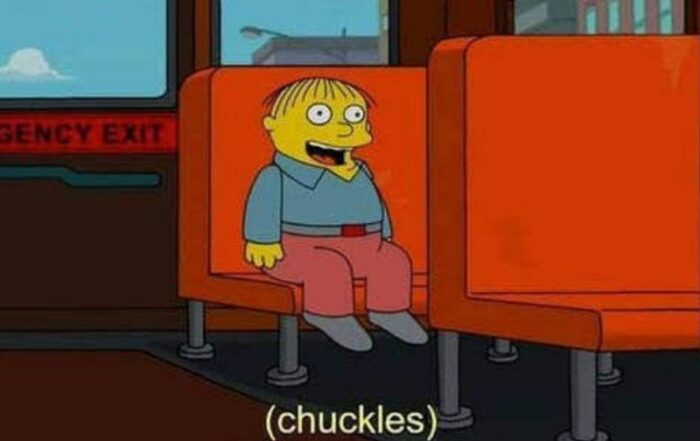Hey! Guess what?! You’re a carer!
When I first realised that I was a carer for my beloved little Cockney grandma*, I had, in fact, already been one for over a year.
It was early 2022. I’d been scrolling on Tumblr and had seen a post about someone’s experience caring for a parent. They’d written out a list of their responsibilities, and later in the thread, someone had posted a link to the carers page of the Citizen’s Advice Bureau.
Hmm, I thought. I already know what it means to be a carer, so I know that I’m not one for Grandma – but maybe I’ll have a read, just to see.
I had a quick glance through the article, had my mind blown, and fired up the family WhatsApp group. “Guys,” I wrote, “according to this article, we’re all technically carers for Grandma!”
This was huge news! I had no idea that what we did as a family to support my 92-year-old Grandma could be classed as care! It was not, however, huge news to my sister, an NHS Occupational Therapist and my step-mum, who is a care professional at a nursing home.
“Yes, Gen,” my step-mum replied, “you’ve been a carer since before the pandemic, when you started doing Grandma’s shopping and taking her to appointments!”
Ah, I thought. So, it turns out I do NOT know what it means to be a carer.
Surprise! You are a carer :)
According to the NHS, it takes an average of two years for people to acknowledge their role as a carer. Obviously, I can relate.
While there are so many reasons folks might not realise or recognise that they’re carers, one of the biggest barriers to this is that it can be difficult to view your caring role as separate from the relationship you have with the person you’re looking after.
In my case, I assumed all the things I did for Grandma was just part of being her grandchild. I love my grandma deeply; she lived with us until I was 15, and she helped raise me and my sisters. She’s one of the main reasons I chose to move back to my hometown, so I could look out for her.
Of course I was going to help her when she needed it. Maybe it sounds a bit daft now, but I didn’t realise that that “help” also counted as caring responsibilities. It never occurred to me that without our support, my grandma would not be able to live independently and safely.
It’s a horrible thought, but if my family and I all decided tomorrow that we weren’t going to help my grandma anymore, she wouldn’t be able to cope.
What kind of stuff does a carer do?
Another reason I didn’t realise I was a carer was because I thought a carer needed to be there at the person’s side, day and night, helping them with physical and personal care.
My grandma lives alone (that’s how she likes it!), in a lovely little bungalow-style cottage that’s part of an assisted living facility. While she doesn’t have 24-hour, hands on care, she does need help. We help her with things like:
- Buying her shopping
- Fulfilling her prescriptions
- Booking and taking her to appointments
- Reminding her to take her pills three times a day
- Monitoring her health
- Managing her finances.
To me, some of these examples don’t strike me as Carer Essentials101. Who hasn’t accompanied a friend, partner or family member to the doctors? Technically, my wife does my shopping for me (because I hate doing it and she is an angel)!
But when you look at it all as a whole… yeah. That’s quite a lot of pretty essential stuff. And while Grandma doesn’t require personal care yet, her needs are changing all the time.
I’m typing this blog post, for example, from a make-shift workspace I’ve cobbled together in my grandma’s little spare bedroom. She’s recently had cataract surgery and as part of her recovery, she needs eye drops applying every two or three hours. She can’t do them herself, so I’m staying with her in the daytime to help her.
Being a carer while self-employed
As the only person in Grandma’s caring team who is self-employed, quite a lot of the in-person caring responsibilities (like post-op eye drops) fall to me. Technically, I make my own schedule and can work from anywhere.
I’m pretty lucky. My family is incredibly aware of the pressure that I’m under as a self-employed person balancing my business with caring responsibilities. While my employed family members can’t set their own working schedules, they also get paid if they take any leave for caring responsibilities. Swings and roundabouts.
It’s hard, but being a carer also serves as an effective reminder for why I chose to be self-employed. So I could sit with my grandma at 11am and watch Judge Judy for 5 minutes** before getting on with my work. Honestly, living the dream.
I wouldn’t have it any other way
According to Carers UK, 1 in 8 adults (around 6.5 million people) are carers. Many of them will be looking after someone solo and that stat doesn’t even take into account the kids who are carers.
My family and I are an amazing team; we work together to make sure my grandma has everything she needs. I don’t know if we could do it alone.
It’s not always easy. Grandma’s care needs are increasing. We’re currently waiting to hear whether we can get some professional carers in to help us look after her properly.
Most importantly, the situation is incredibly difficult for my grandma. She’s not only living with increasingly difficult health conditions, she’s having to endure the gut-wrenching pain of requiring help, when all she wants to do is live independently.
But in terms of me being a carer for my grandma, I wouldn’t have it any other way. When she inevitably starts worrying about how much we do for her, I tell her the same thing every time:
“We’re a team. You looked after me, now I’d like you to let me look after you.”
* Despite having lived in the Midlands for about 60 years, she still sounds like she’s stepped straight off a Wandsworth estate and I, for one, think that’s very iconic of her.
** There’s actually no such thing as watching Judge Judy for 5 minutes because it sucks you right in. Before you know it, it’s the end of the show and you’ve just experienced time travel.
More blog posts
Strengthen your relationship with a B2B client with a case study
Want to strengthen your relationship with a B2B client? Ask them to be a case study for you! Case studies are a great way for you to boost your business, but
What kinds of businesses benefit most from having case studies?
Hey! Guess what?! You’re a carer! When I first realised that I was a carer for my beloved little Cockney grandma*, I had, in fact, already been one for over a year.
The seductive power of finishing a project
The seductive power of finishing a project When you finish a massive project or piece of work, how do you tend to react? When I was at university, I was a









